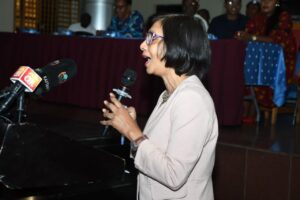UNICEF Urge Nigeria Govt’s to intensify Efforts to Deliver SDG 6 before Set Target

By Fatima Saka
As the whole world drives towards climate resilience and adaptations, the United Nations Children’s Fund has urged the government of Nigeria and other relevant stakeholders to intensify efforts in achieving SDG 6, revealing the vulnerability of Nigeria children to diverse climate change related disaster
Analyzing the impact of climate change on children, UNICEF revealed that the November-launched report Analysis outlined the vulnerability of Nigerian children to diverse climate-related challenges, such as droughts and floods.
The UNICEF Deputy Representative, Dr. Rownak Khan, made this assertion on Thursday in Abuja during the Annual Federal Government of Nigeria/United Nations International Children’s Emergency Fund (UNICEF) WASH Review meeting.

Dr. Khan further revealed that UNICEF planned to partner with the Ministry of Environment and the Ministry of Water and Sanitation to formulate an action plan in response to these climate challenges.
She emphasized on the need for unwavering commitment and advocate’s for robust policies to guarantee access to safe drinking water and a Nation free from Open Defecation by 2025.
“In addition to addressing water contamination, the organization is actively involved in training local counterparts to maintain functional water points and improve access to clean sanitary facilities.
“These efforts are part of the Clean Nigeria campaign, which aims to eliminate open defecation practices.
“Moreover, UNICEF’s engagement extends beyond the school environment, reaching communities where access to clean water and sanitation is essential for all children, whether in school or not.
The Minister of Water Resources and Sanitation, Engr. Prof. Joseph Terlumun, Utsev, reiterated Federal Government’s steadfast dedication to advancing Nationwide access to Water, Sanitation, and Hygiene Services (WASH) and also emphasized the pivotal role of WASH in fostering Socio-economic Development by promoting public health, reducing disease burdens, and laying a foundation for Sustainable Growth and well-being.
He reaffirmed Nigeria’s commitment to achieving Sustainable Development Goal 6, ensuring the availability and Sustainable Management of Water and Sanitation for all, and ending Open Defecation in the country. He also underscored the impact of the Federal Government’s commitment to the National WASH policy, SchoolWASH, YouthWASH, and HealthWASH initiatives.
Prof Utsev urged participants to spotlight Policies and Programmes to address WASH deficits, reflect on accomplishments, and foster innovative Strategies to expedite growth in this critical Sector.
Earlier at the event, the Permanent Secretary of the Federal Ministry of Water Resources and Sanitation, Alhaji Shehu Aliyu Shinkafi, represented by the Director of Water Quality Control and Sanitation,
Mrs. Elizabeth Ugoh,emphasized the importance of the WASH Sector’s Annual Review meeting. He highlighted the need for a collective understanding of achievements, lessons learned, and setting priorities for 2024 and beyond.
The Permanent Secretary expressed appreciation for the commendable efforts of Development Partners and UNICEF, recognizing their significant contributions to successfully attain WASH objectives.
Present at the Review Meeting were UNICEF Chief of WASH, Jane Bevan, representatives of States’ RUWASSA, a representative of WaterAid, representatives of line Ministries (Environment, Health, Bureau of Statistics), and other eminent stakeholders.





